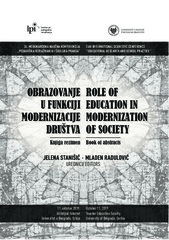Приказ основних података о документу
Kakav sam u školi : narativi učenika osnovne škole o sebi
Who am i at school : self-narratives of elementary school students
| dc.contributor | Stanišić, Jelena | |
| dc.contributor | Radulović, Mladen | |
| dc.creator | Grbić, Sanja | |
| dc.creator | Maksić, Slavica | |
| dc.date.accessioned | 2021-08-19T09:09:56Z | |
| dc.date.available | 2021-08-19T09:09:56Z | |
| dc.date.issued | 2019 | |
| dc.identifier.isbn | 978-86-7447-147-0 | |
| dc.identifier.uri | http://ipir.ipisr.org.rs/handle/123456789/571 | |
| dc.description.abstract | Razvoj identiteta pojedinaca usklađenog sa vrednostima moderne društvene zajednice predstavlja ključan uslov modernizacije društva. Za mlade, ovaj razvoj se, na prvom mestu, odvija kroz participaciju u školskom životu. Pošavši od procesne teorije kokonstrukcije identiteta u okviru narativne psihologije, prema kojoj se identitet konstruiše kroz konarativizaciju autobiografskih događaja u interakcijama unutar porodičnog i vršnjačkog kruga, pokušale smo da identifikujemo koji se aspekti participacije učenika u školskom okruženju mogu prepoznati kao ključni za konstruisanje doživljaja sebe u školi. Na prigodnom uzorku učenika osmog razreda (N=93) primenjen je upitnik koji je sadržao pitanja otvorenog tipa o događaju koji ih dobro opisuje u kontekstu škole. Izvedena je narativna analiza induktivnog tipa koja je rezultirala definisanjem četiri oblasti: školski uspeh i disciplina, odnosi sa drugovima, odnosi sa nastavnicima i opšti doživljaj škole. Najveći broj učenika osvrnuo se na svoj školski uspeh i vladanje i to, uglavnom, na stereotipan i neelaborisan način (solidni đaci; neproblematični), a u ukupnom doživljaju školskog učenja dominantna je monotonija i afektivna zaravnjenost. Najdetaljnije su opisani odnosi sa drugovima, u kojima se ističe važnost imanja dobrih prijatelja, uloge sebe kao dobrog druga („uvek pokrivam leđa prijatelju”) i prihvaćenosti uopšte, čije odsustvo jedan deo učenika čini uznemirenim i nesigurnim. Najsnažnije su emocionalno zasićeni opisi odnosa sa nastavnicima koji govore o nedoslednosti u zahtevima i neočekivanim ponašanjima nastavnika. U celini, odnosi sa drugovima i sa nastavnicima boje učenikov sveukupan doživljaj škole. Podaci ukazuju na veliku važnost kvaliteta socijalnih odnosa za kokonstruisanje sopstvenog identiteta i celokupnog vrednosno-afektivnog odnosa prema školi. Zaključeno je da postoji potreba za posvećivanjem pažnje „mekim” relacionim aspektima života mladih u školskoj zajednici. | sr |
| dc.description.abstract | The development of individual identity in line with the values of modern society represents an essential condition for its modernization. For the young, that development occurs primarily through their participation in the school life. Relying on the process theory of identity co-construction within narrative psychology, which proposes that identity is constructed through the process of co-narration of autobiographical events in interactions with family members and peers, we have tried to identify those aspects of students’ participation in the school life that are crucial to constructing the experience of oneself in school. The study was conducted on convenient sample of eight-grade students (N=93) who completed an open-ended questionnaire. Students were asked to describe an event that faithfully portrays who they are when they are at school. Narrative analysis was applied to collected data using inductive approach. This resulted in defining four content areas: academic achievement and discipline, peer relationships, relations with teachers and general view on the school. Majority of students spontaneously reported their academic achievement and discipline, and did so mostly in stereotypical and non-elaborate manner (”average students”, ”trying not to make trouble”), while boredom and emotional flatness dominated their general school experience. The most elaborated descriptions were given for the peer relationships. Students emphasized the importance of having good friends and being a good friend (“I always have my friends’ back“) and those who lacked peer acceptance reported feeling upset and insecure. Parts of the students’ narratives that bore the strongest emotional saturation addressed their relations with teachers and referred to inconsistent demands and unexpected behaviour of teachers. On the whole, relations with peers and teachers shaped students’ general school experience. Findings point to a substantial influence of the nature of social relations for co-construction of student identity and their overall evaluative and emotional stance toward school. It was concluded that considerable attention should be paid to „soft“, relational aspects of the students’ life in the school community. | sr |
| dc.language.iso | sr | sr |
| dc.language.iso | en | sr |
| dc.publisher | Beograd : Institut za pedagoška istraživanja | sr |
| dc.relation | info:eu-repo/grantAgreement/MESTD/Basic Research (BR or ON)/179034/RS// | sr |
| dc.relation | info:eu-repo/grantAgreement/MESTD/Integrated and Interdisciplinary Research (IIR or III)/47008/RS// | sr |
| dc.rights | openAccess | sr |
| dc.rights.uri | https://creativecommons.org/licenses/by/4.0/ | |
| dc.source | Obrazovanje u funkciji modernizacije društva | sr |
| dc.subject | osnovna škola | sr |
| dc.subject | učenici | sr |
| dc.subject | narativna analiza | sr |
| dc.subject | kokonstrukcija identiteta | sr |
| dc.subject | socijalni odnosi | sr |
| dc.subject | primary school | sr |
| dc.subject | students | sr |
| dc.subject | narrative analysis | sr |
| dc.subject | co-construction of identity | sr |
| dc.subject | social relationships | sr |
| dc.title | Kakav sam u školi : narativi učenika osnovne škole o sebi | sr |
| dc.title | Who am i at school : self-narratives of elementary school students | sr |
| dc.type | conferenceObject | sr |
| dc.rights.license | BY | sr |
| dc.citation.epage | 101 | |
| dc.citation.spage | 100 | |
| dc.description.other | Zbornik rezimea / 24. Međunarodna naučna konferencija "Pedagoška istraživanja i školska praksa | sr |
| dc.description.other | Book of abstracts / 24th International Scientific Conference "Educational Research and School Practice" | |
| dc.identifier.fulltext | http://ipir.ipisr.org.rs/bitstream/id/1709/Kakav_sam_u_skoli_2019.pdf | |
| dc.identifier.rcub | https://hdl.handle.net/21.15107/rcub_ipir_571 | |
| dc.type.version | publishedVersion | sr |

